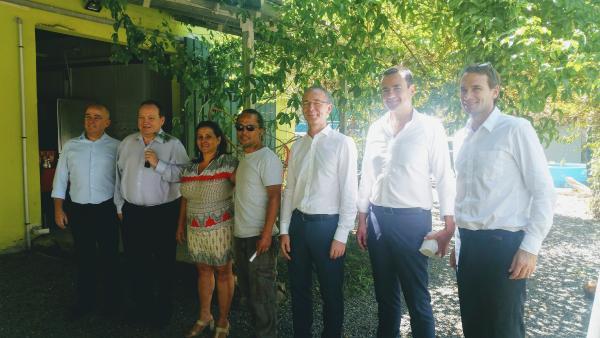
La BEI s’engage davantage en Nouvelle-Calédonie et dans les Pays et Territoires d’Outre-Mer
Two important agreements marked the two-day visit (30-31 October) to Nouméa, New Caledonia, by a delegation of the European Investment Bank (EIB) led by EIB Vice-President Ambroise Fayolle.
2. Extension of the Juncker Plan in the French overseas territories
On 30 October, the first day of meetings, the European Investment Bank and Agence Française de Développement (AFD) signed an extension of the existing risk-sharing agreement for the French overseas territories. This agreement comes under the Investment Plan for Europe – commonly known as the “Juncker Plan” – which is implemented by the EIB and aims to get investment back on track in the EU.
The EIB financing will enable the AFD to take a greater share of the risk in financing projects that are vital for the economic development and competitiveness of the outermost regions as well as the daily lives of those living there. The extension signed on 30 October in Nouméa will for the first time enable this facility to be extended to the French overseas territories.
The total amount of financing provided under this programme will thus be increased by EUR 30m to EUR 180m.
“The extension signed today in support of French overseas territories is especially important because the EIB's Juncker Plan financing concerns regions that until now did not have access to such funding”, said EIB Vice-President Ambroise Fayolle at the signing ceremony.
To find out more go to:
2. Signature of an agreement with BCI for projects in the countryside
Also on 31 October, the EIB and Banque Calédonienne d’Investissement (BCI) signed a financing agreement worth EUR 20m intended to fund projects by small New Caledonian businesses in the countryside and by firms with fewer than five employees in Greater Nouméa.
The agreement was signed at BCI's headquarters by EIB Vice-President Ambroise Fayolle and BCI's CEO Thierry Charras-Gillot.
The credit line granted by the EIB to BCI is the biggest loan provided to date via banking intermediaries in the Pacific. This credit line will therefore enable BCI to finance the long and medium-term activities of New Caledonian businesses outside the capital (in the countryside) and microenterprises in municipalities on the outskirts of Nouméa (Dumbéa, Païta and Le Mont-Dore).
Capping a long-standing partnership between the EIB and BCI, which had until now been focused on environmental projects, this new agreement will help to develop all of New Caledonia and redress the balance between its different areas.
“This second component of our visit to Nouméa confirms the European Investment Bank’s firm commitment to New Caledonia and the French overseas territories”, said EIB Vice-President Ambroise Fayolle. “We are pleased to be able to strengthen our cooperation with Banque Calédonienne d’Investissement and to extend it to areas in which bank financing is sometimes limited due to funding capacity that is traditionally lower than in the territory's main centres.”
BCI, which is the leading financier of New Caledonia's economy and the territory's largest banking network with 33 outlets, is stepping up its support for New Caledonian businesses thanks to this agreement. This also confirms BCI’s status as the chief contributor to the development of the countryside. Thanks to this financing agreement with the EIB, BCI can also increase the amount of funding that it devotes to redressing the balance between the territory’s different areas. It should be pointed out that New Caledonian banks in general and BCI in particular, given its key role in financing the country's economy, suffer from a lack of local financial resources.
The EIB and BCI teams have therefore built this agreement in the spirit of partnership. BCI is contributing its deep knowledge of the territory, including in areas where it is the sole banking representative, whilst the EIB is providing its financial strength. BCI thus has access to new external sources of financing, which will help to reduce the territory's structural deficit in terms of raising funds.

